Talent Management in Unilever: Research Methodology and Analysis
VerifiedAdded on 2022/12/05
|16
|3330
|39
Report
AI Summary
This report provides a detailed analysis of talent management practices within Unilever, a multinational consumer goods company. It begins with an introduction to talent management and its significance, followed by an exploration of the research methodology employed, including interpretivism philosophy, and qualitative and quantitative approaches. The report outlines data collection methods, such as primary and secondary data, along with the use of questionnaires and sampling techniques. Ethical considerations in research are also addressed. The main body delves into data analysis, presenting findings from a questionnaire administered to 30 employees, using frequency analysis, graphs and pie charts. The analysis covers employee awareness of talent management, its importance, impact on organizational growth, and Unilever's strategies. The report also discusses challenges like employee turnover, and strategies for employee retention, including HR practices, motivation, and interpersonal skills. The report concludes with recommendations based on the data analysis and provides references to relevant literature.
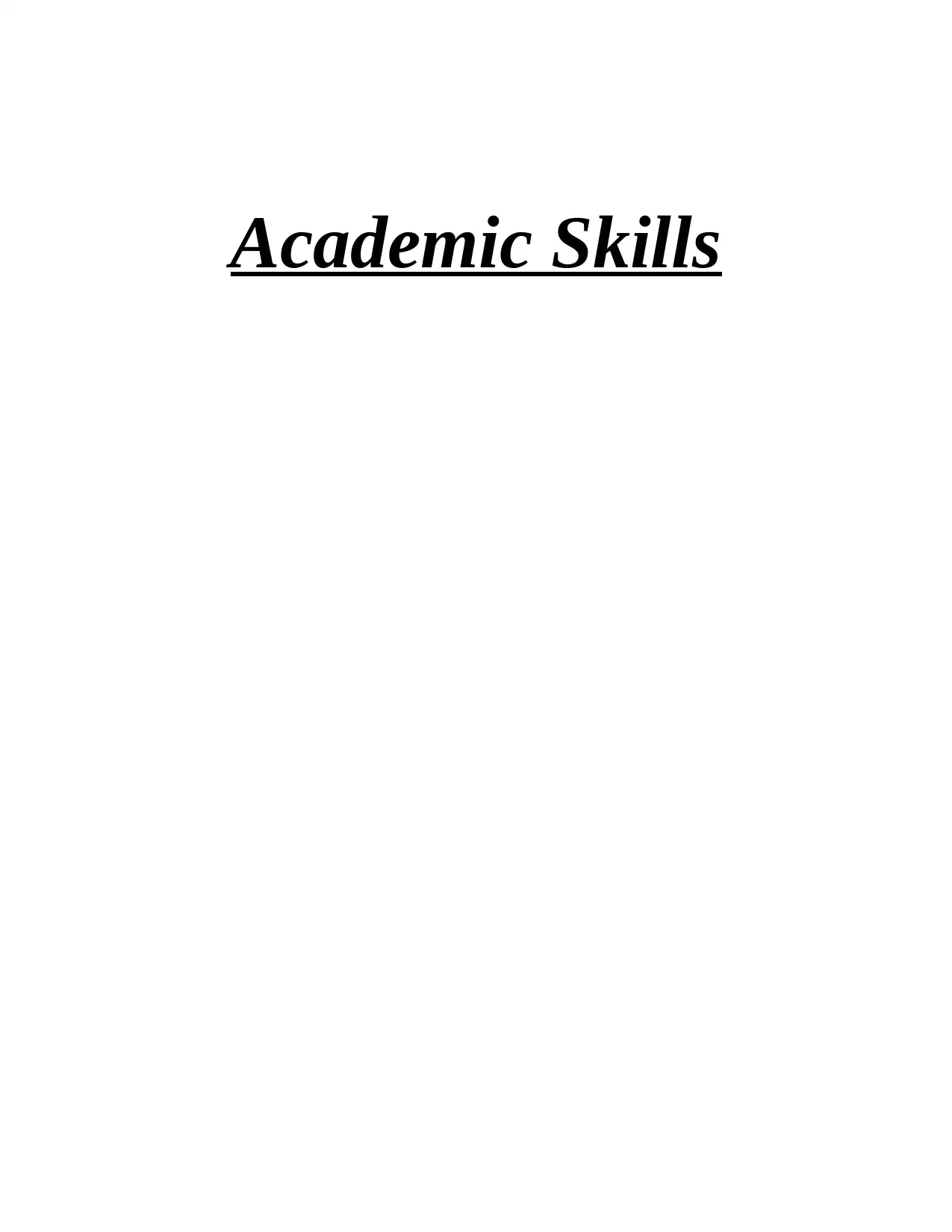
Academic Skills
Paraphrase This Document
Need a fresh take? Get an instant paraphrase of this document with our AI Paraphraser
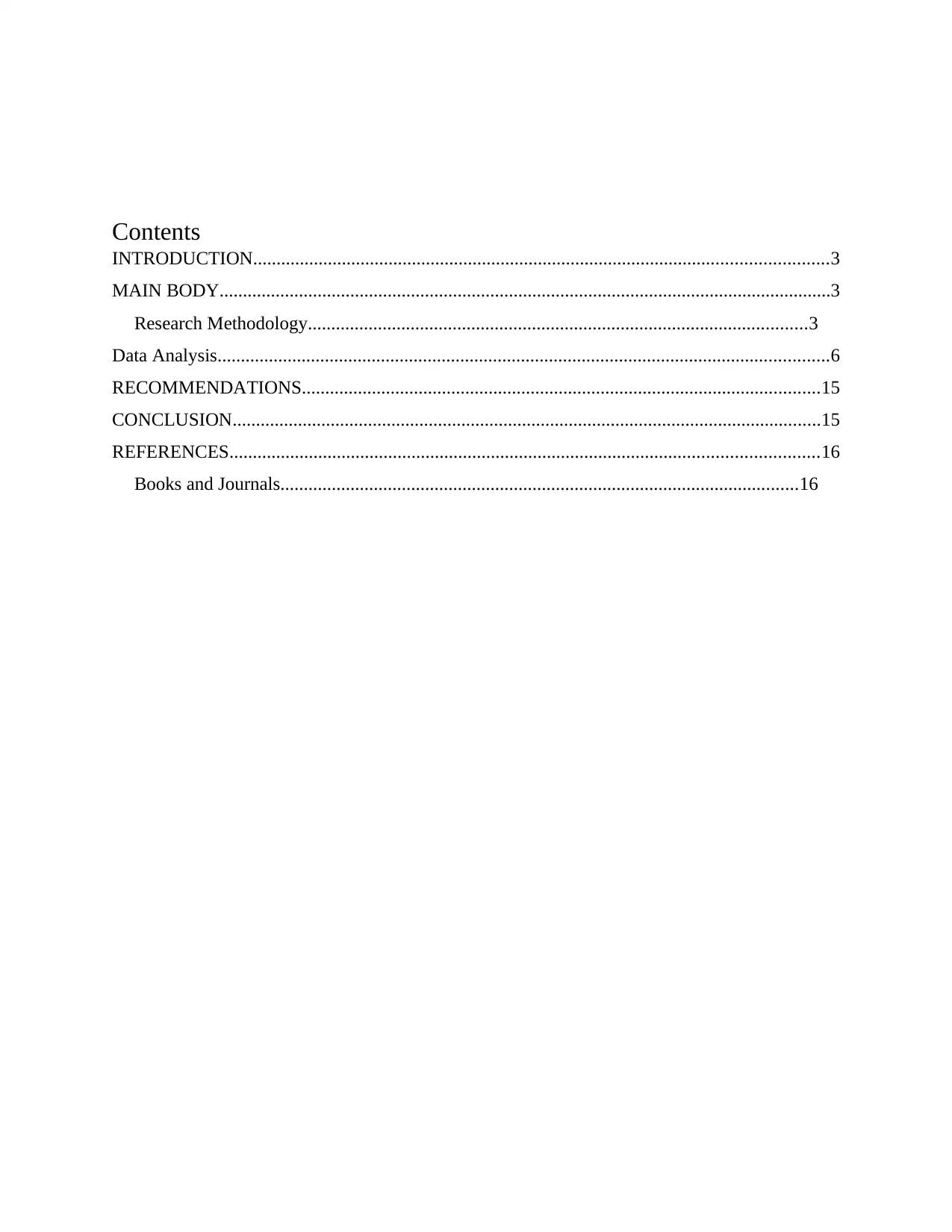
Contents
INTRODUCTION...........................................................................................................................3
MAIN BODY...................................................................................................................................3
Research Methodology...........................................................................................................3
Data Analysis...................................................................................................................................6
RECOMMENDATIONS...............................................................................................................15
CONCLUSION..............................................................................................................................15
REFERENCES..............................................................................................................................16
Books and Journals...............................................................................................................16
INTRODUCTION...........................................................................................................................3
MAIN BODY...................................................................................................................................3
Research Methodology...........................................................................................................3
Data Analysis...................................................................................................................................6
RECOMMENDATIONS...............................................................................................................15
CONCLUSION..............................................................................................................................15
REFERENCES..............................................................................................................................16
Books and Journals...............................................................................................................16
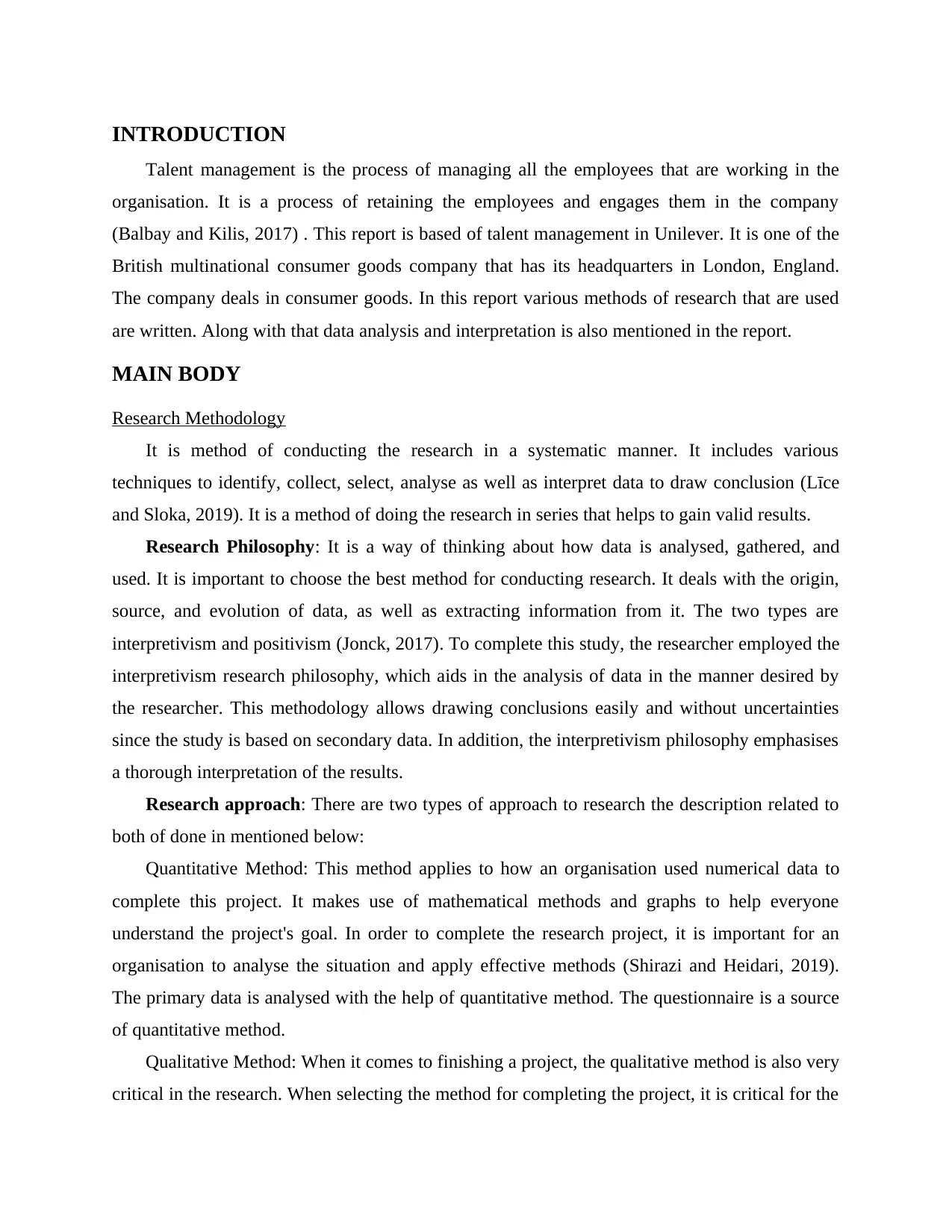
INTRODUCTION
Talent management is the process of managing all the employees that are working in the
organisation. It is a process of retaining the employees and engages them in the company
(Balbay and Kilis, 2017) . This report is based of talent management in Unilever. It is one of the
British multinational consumer goods company that has its headquarters in London, England.
The company deals in consumer goods. In this report various methods of research that are used
are written. Along with that data analysis and interpretation is also mentioned in the report.
MAIN BODY
Research Methodology
It is method of conducting the research in a systematic manner. It includes various
techniques to identify, collect, select, analyse as well as interpret data to draw conclusion (Līce
and Sloka, 2019). It is a method of doing the research in series that helps to gain valid results.
Research Philosophy: It is a way of thinking about how data is analysed, gathered, and
used. It is important to choose the best method for conducting research. It deals with the origin,
source, and evolution of data, as well as extracting information from it. The two types are
interpretivism and positivism (Jonck, 2017). To complete this study, the researcher employed the
interpretivism research philosophy, which aids in the analysis of data in the manner desired by
the researcher. This methodology allows drawing conclusions easily and without uncertainties
since the study is based on secondary data. In addition, the interpretivism philosophy emphasises
a thorough interpretation of the results.
Research approach: There are two types of approach to research the description related to
both of done in mentioned below:
Quantitative Method: This method applies to how an organisation used numerical data to
complete this project. It makes use of mathematical methods and graphs to help everyone
understand the project's goal. In order to complete the research project, it is important for an
organisation to analyse the situation and apply effective methods (Shirazi and Heidari, 2019).
The primary data is analysed with the help of quantitative method. The questionnaire is a source
of quantitative method.
Qualitative Method: When it comes to finishing a project, the qualitative method is also very
critical in the research. When selecting the method for completing the project, it is critical for the
Talent management is the process of managing all the employees that are working in the
organisation. It is a process of retaining the employees and engages them in the company
(Balbay and Kilis, 2017) . This report is based of talent management in Unilever. It is one of the
British multinational consumer goods company that has its headquarters in London, England.
The company deals in consumer goods. In this report various methods of research that are used
are written. Along with that data analysis and interpretation is also mentioned in the report.
MAIN BODY
Research Methodology
It is method of conducting the research in a systematic manner. It includes various
techniques to identify, collect, select, analyse as well as interpret data to draw conclusion (Līce
and Sloka, 2019). It is a method of doing the research in series that helps to gain valid results.
Research Philosophy: It is a way of thinking about how data is analysed, gathered, and
used. It is important to choose the best method for conducting research. It deals with the origin,
source, and evolution of data, as well as extracting information from it. The two types are
interpretivism and positivism (Jonck, 2017). To complete this study, the researcher employed the
interpretivism research philosophy, which aids in the analysis of data in the manner desired by
the researcher. This methodology allows drawing conclusions easily and without uncertainties
since the study is based on secondary data. In addition, the interpretivism philosophy emphasises
a thorough interpretation of the results.
Research approach: There are two types of approach to research the description related to
both of done in mentioned below:
Quantitative Method: This method applies to how an organisation used numerical data to
complete this project. It makes use of mathematical methods and graphs to help everyone
understand the project's goal. In order to complete the research project, it is important for an
organisation to analyse the situation and apply effective methods (Shirazi and Heidari, 2019).
The primary data is analysed with the help of quantitative method. The questionnaire is a source
of quantitative method.
Qualitative Method: When it comes to finishing a project, the qualitative method is also very
critical in the research. When selecting the method for completing the project, it is critical for the
⊘ This is a preview!⊘
Do you want full access?
Subscribe today to unlock all pages.

Trusted by 1+ million students worldwide
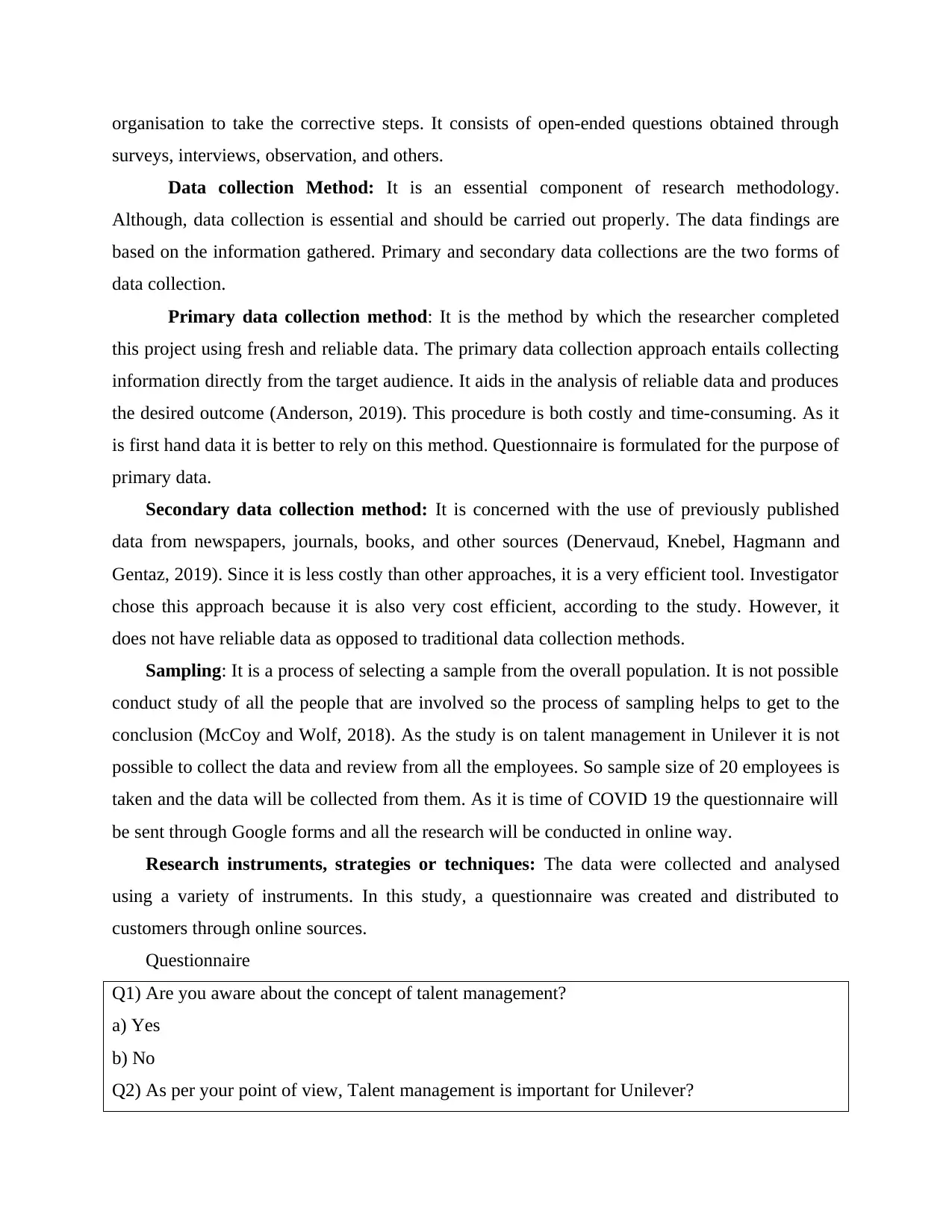
organisation to take the corrective steps. It consists of open-ended questions obtained through
surveys, interviews, observation, and others.
Data collection Method: It is an essential component of research methodology.
Although, data collection is essential and should be carried out properly. The data findings are
based on the information gathered. Primary and secondary data collections are the two forms of
data collection.
Primary data collection method: It is the method by which the researcher completed
this project using fresh and reliable data. The primary data collection approach entails collecting
information directly from the target audience. It aids in the analysis of reliable data and produces
the desired outcome (Anderson, 2019). This procedure is both costly and time-consuming. As it
is first hand data it is better to rely on this method. Questionnaire is formulated for the purpose of
primary data.
Secondary data collection method: It is concerned with the use of previously published
data from newspapers, journals, books, and other sources (Denervaud, Knebel, Hagmann and
Gentaz, 2019). Since it is less costly than other approaches, it is a very efficient tool. Investigator
chose this approach because it is also very cost efficient, according to the study. However, it
does not have reliable data as opposed to traditional data collection methods.
Sampling: It is a process of selecting a sample from the overall population. It is not possible
conduct study of all the people that are involved so the process of sampling helps to get to the
conclusion (McCoy and Wolf, 2018). As the study is on talent management in Unilever it is not
possible to collect the data and review from all the employees. So sample size of 20 employees is
taken and the data will be collected from them. As it is time of COVID 19 the questionnaire will
be sent through Google forms and all the research will be conducted in online way.
Research instruments, strategies or techniques: The data were collected and analysed
using a variety of instruments. In this study, a questionnaire was created and distributed to
customers through online sources.
Questionnaire
Q1) Are you aware about the concept of talent management?
a) Yes
b) No
Q2) As per your point of view, Talent management is important for Unilever?
surveys, interviews, observation, and others.
Data collection Method: It is an essential component of research methodology.
Although, data collection is essential and should be carried out properly. The data findings are
based on the information gathered. Primary and secondary data collections are the two forms of
data collection.
Primary data collection method: It is the method by which the researcher completed
this project using fresh and reliable data. The primary data collection approach entails collecting
information directly from the target audience. It aids in the analysis of reliable data and produces
the desired outcome (Anderson, 2019). This procedure is both costly and time-consuming. As it
is first hand data it is better to rely on this method. Questionnaire is formulated for the purpose of
primary data.
Secondary data collection method: It is concerned with the use of previously published
data from newspapers, journals, books, and other sources (Denervaud, Knebel, Hagmann and
Gentaz, 2019). Since it is less costly than other approaches, it is a very efficient tool. Investigator
chose this approach because it is also very cost efficient, according to the study. However, it
does not have reliable data as opposed to traditional data collection methods.
Sampling: It is a process of selecting a sample from the overall population. It is not possible
conduct study of all the people that are involved so the process of sampling helps to get to the
conclusion (McCoy and Wolf, 2018). As the study is on talent management in Unilever it is not
possible to collect the data and review from all the employees. So sample size of 20 employees is
taken and the data will be collected from them. As it is time of COVID 19 the questionnaire will
be sent through Google forms and all the research will be conducted in online way.
Research instruments, strategies or techniques: The data were collected and analysed
using a variety of instruments. In this study, a questionnaire was created and distributed to
customers through online sources.
Questionnaire
Q1) Are you aware about the concept of talent management?
a) Yes
b) No
Q2) As per your point of view, Talent management is important for Unilever?
Paraphrase This Document
Need a fresh take? Get an instant paraphrase of this document with our AI Paraphraser
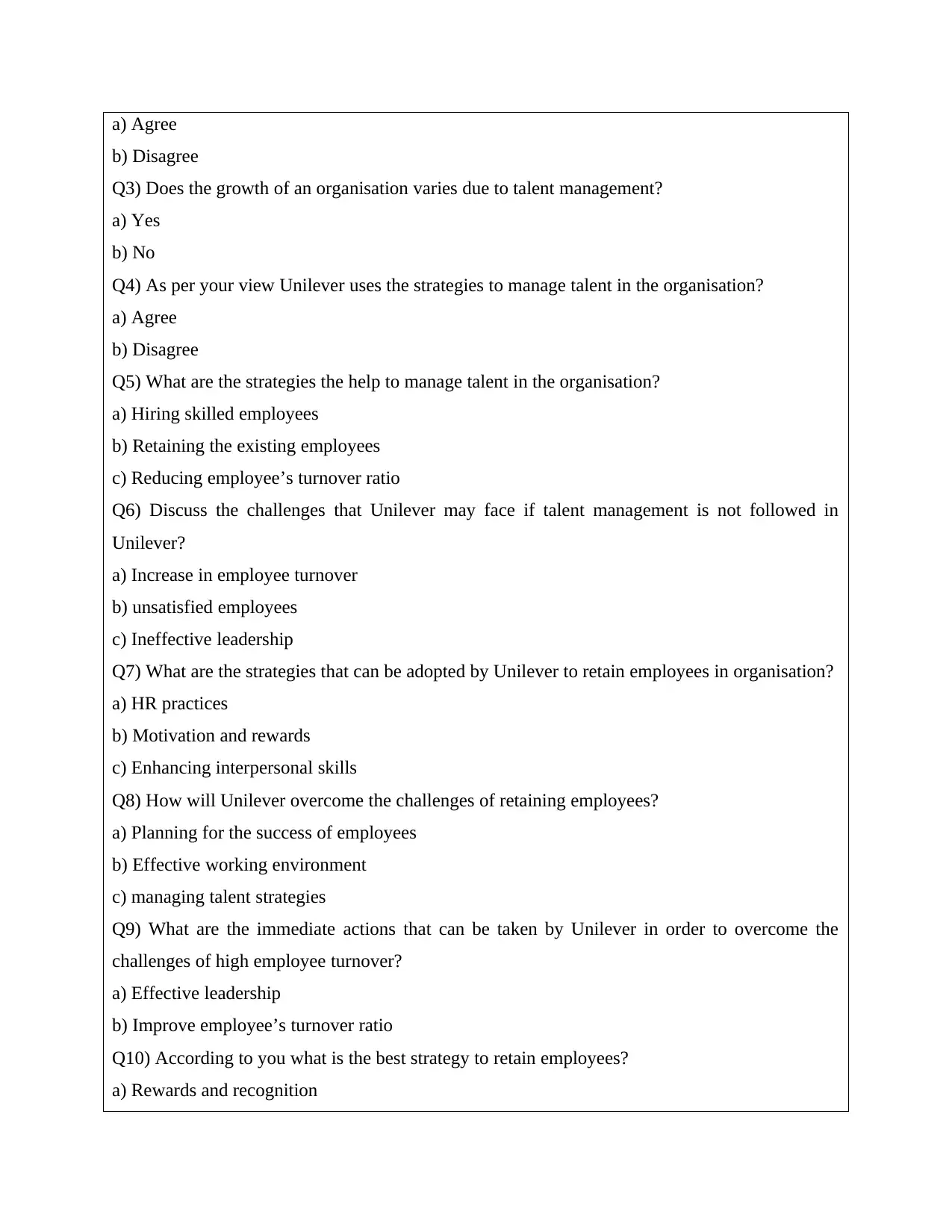
a) Agree
b) Disagree
Q3) Does the growth of an organisation varies due to talent management?
a) Yes
b) No
Q4) As per your view Unilever uses the strategies to manage talent in the organisation?
a) Agree
b) Disagree
Q5) What are the strategies the help to manage talent in the organisation?
a) Hiring skilled employees
b) Retaining the existing employees
c) Reducing employee’s turnover ratio
Q6) Discuss the challenges that Unilever may face if talent management is not followed in
Unilever?
a) Increase in employee turnover
b) unsatisfied employees
c) Ineffective leadership
Q7) What are the strategies that can be adopted by Unilever to retain employees in organisation?
a) HR practices
b) Motivation and rewards
c) Enhancing interpersonal skills
Q8) How will Unilever overcome the challenges of retaining employees?
a) Planning for the success of employees
b) Effective working environment
c) managing talent strategies
Q9) What are the immediate actions that can be taken by Unilever in order to overcome the
challenges of high employee turnover?
a) Effective leadership
b) Improve employee’s turnover ratio
Q10) According to you what is the best strategy to retain employees?
a) Rewards and recognition
b) Disagree
Q3) Does the growth of an organisation varies due to talent management?
a) Yes
b) No
Q4) As per your view Unilever uses the strategies to manage talent in the organisation?
a) Agree
b) Disagree
Q5) What are the strategies the help to manage talent in the organisation?
a) Hiring skilled employees
b) Retaining the existing employees
c) Reducing employee’s turnover ratio
Q6) Discuss the challenges that Unilever may face if talent management is not followed in
Unilever?
a) Increase in employee turnover
b) unsatisfied employees
c) Ineffective leadership
Q7) What are the strategies that can be adopted by Unilever to retain employees in organisation?
a) HR practices
b) Motivation and rewards
c) Enhancing interpersonal skills
Q8) How will Unilever overcome the challenges of retaining employees?
a) Planning for the success of employees
b) Effective working environment
c) managing talent strategies
Q9) What are the immediate actions that can be taken by Unilever in order to overcome the
challenges of high employee turnover?
a) Effective leadership
b) Improve employee’s turnover ratio
Q10) According to you what is the best strategy to retain employees?
a) Rewards and recognition
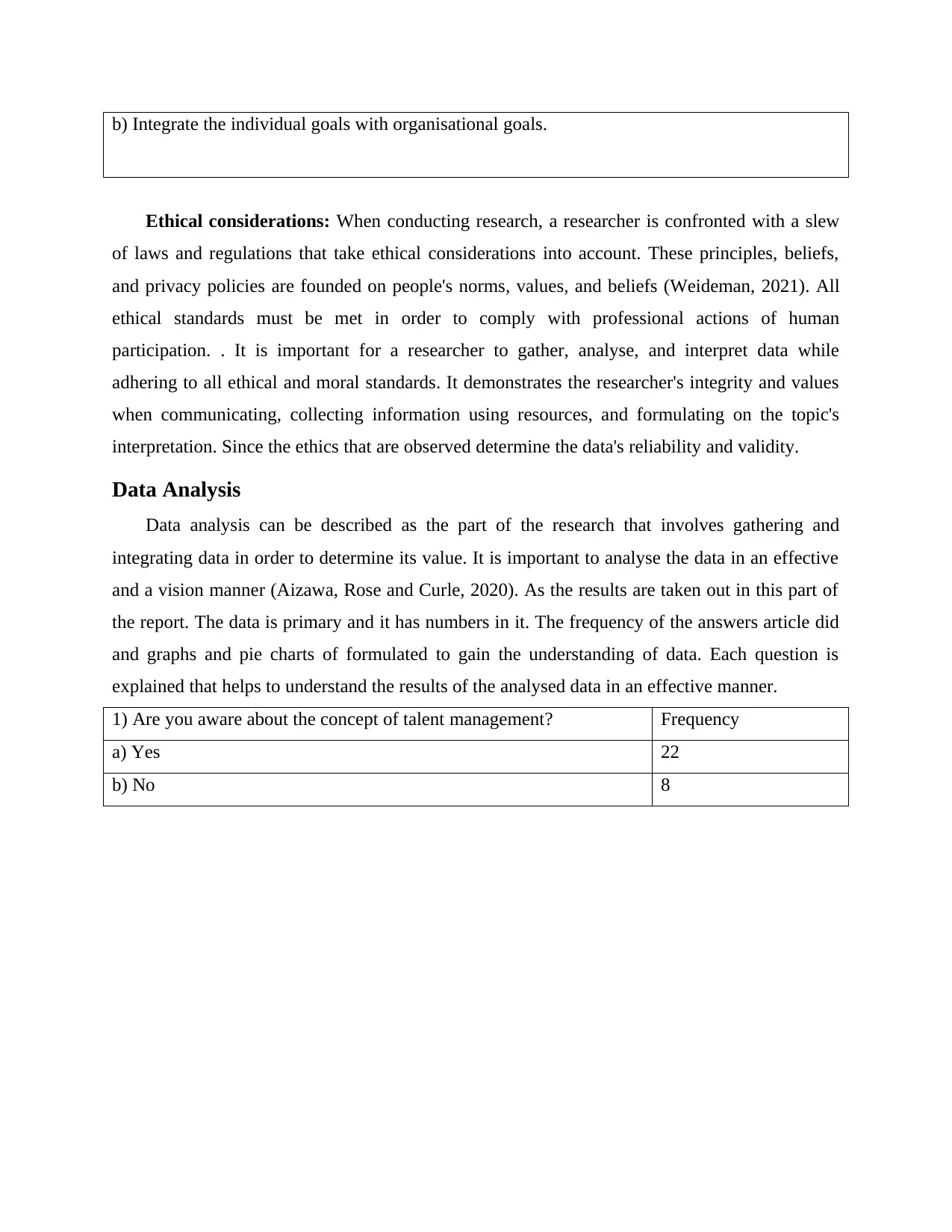
b) Integrate the individual goals with organisational goals.
Ethical considerations: When conducting research, a researcher is confronted with a slew
of laws and regulations that take ethical considerations into account. These principles, beliefs,
and privacy policies are founded on people's norms, values, and beliefs (Weideman, 2021). All
ethical standards must be met in order to comply with professional actions of human
participation. . It is important for a researcher to gather, analyse, and interpret data while
adhering to all ethical and moral standards. It demonstrates the researcher's integrity and values
when communicating, collecting information using resources, and formulating on the topic's
interpretation. Since the ethics that are observed determine the data's reliability and validity.
Data Analysis
Data analysis can be described as the part of the research that involves gathering and
integrating data in order to determine its value. It is important to analyse the data in an effective
and a vision manner (Aizawa, Rose and Curle, 2020). As the results are taken out in this part of
the report. The data is primary and it has numbers in it. The frequency of the answers article did
and graphs and pie charts of formulated to gain the understanding of data. Each question is
explained that helps to understand the results of the analysed data in an effective manner.
1) Are you aware about the concept of talent management? Frequency
a) Yes 22
b) No 8
Ethical considerations: When conducting research, a researcher is confronted with a slew
of laws and regulations that take ethical considerations into account. These principles, beliefs,
and privacy policies are founded on people's norms, values, and beliefs (Weideman, 2021). All
ethical standards must be met in order to comply with professional actions of human
participation. . It is important for a researcher to gather, analyse, and interpret data while
adhering to all ethical and moral standards. It demonstrates the researcher's integrity and values
when communicating, collecting information using resources, and formulating on the topic's
interpretation. Since the ethics that are observed determine the data's reliability and validity.
Data Analysis
Data analysis can be described as the part of the research that involves gathering and
integrating data in order to determine its value. It is important to analyse the data in an effective
and a vision manner (Aizawa, Rose and Curle, 2020). As the results are taken out in this part of
the report. The data is primary and it has numbers in it. The frequency of the answers article did
and graphs and pie charts of formulated to gain the understanding of data. Each question is
explained that helps to understand the results of the analysed data in an effective manner.
1) Are you aware about the concept of talent management? Frequency
a) Yes 22
b) No 8
⊘ This is a preview!⊘
Do you want full access?
Subscribe today to unlock all pages.

Trusted by 1+ million students worldwide
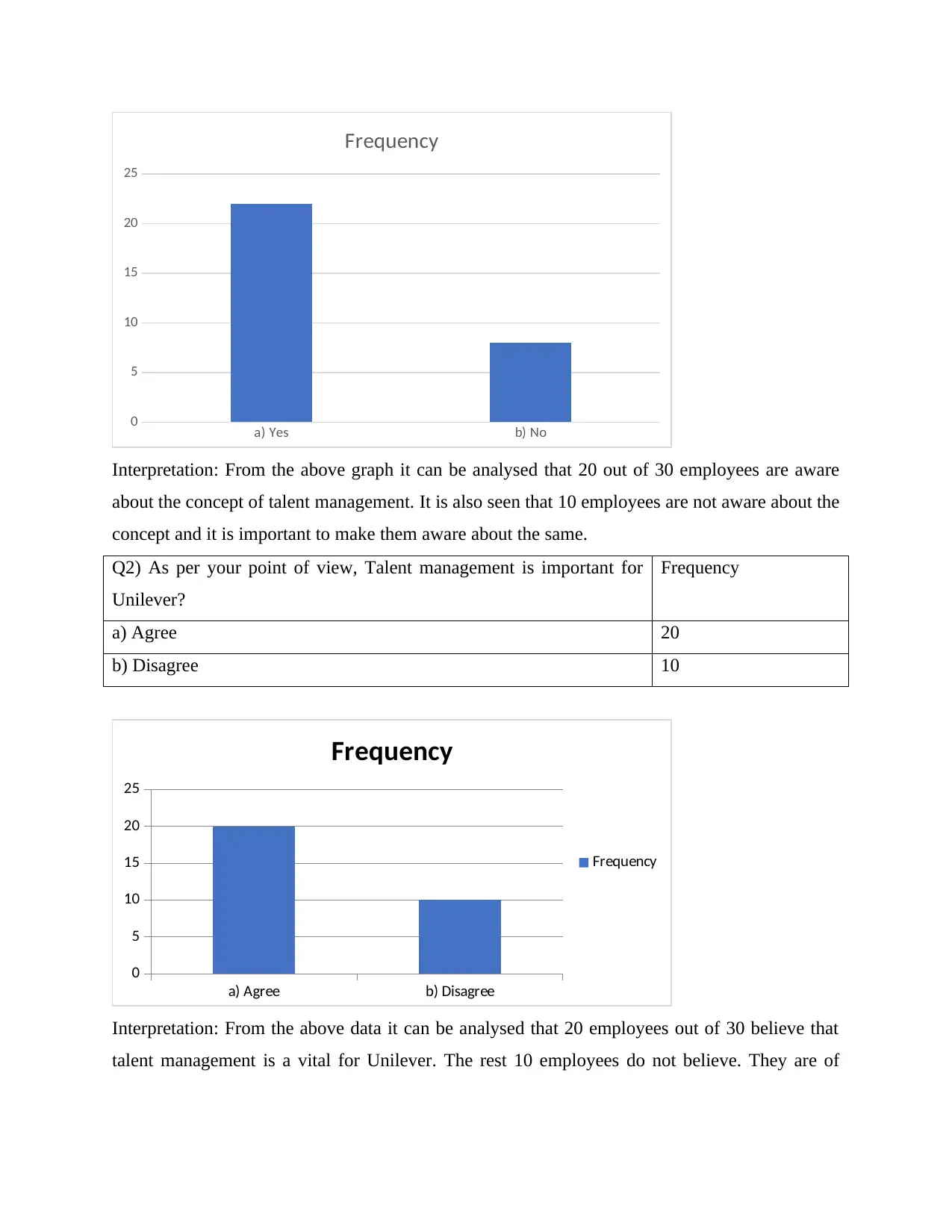
a) Yes b) No
0
5
10
15
20
25
Frequency
Interpretation: From the above graph it can be analysed that 20 out of 30 employees are aware
about the concept of talent management. It is also seen that 10 employees are not aware about the
concept and it is important to make them aware about the same.
Q2) As per your point of view, Talent management is important for
Unilever?
Frequency
a) Agree 20
b) Disagree 10
a) Agree b) Disagree
0
5
10
15
20
25
Frequency
Frequency
Interpretation: From the above data it can be analysed that 20 employees out of 30 believe that
talent management is a vital for Unilever. The rest 10 employees do not believe. They are of
0
5
10
15
20
25
Frequency
Interpretation: From the above graph it can be analysed that 20 out of 30 employees are aware
about the concept of talent management. It is also seen that 10 employees are not aware about the
concept and it is important to make them aware about the same.
Q2) As per your point of view, Talent management is important for
Unilever?
Frequency
a) Agree 20
b) Disagree 10
a) Agree b) Disagree
0
5
10
15
20
25
Frequency
Frequency
Interpretation: From the above data it can be analysed that 20 employees out of 30 believe that
talent management is a vital for Unilever. The rest 10 employees do not believe. They are of
Paraphrase This Document
Need a fresh take? Get an instant paraphrase of this document with our AI Paraphraser
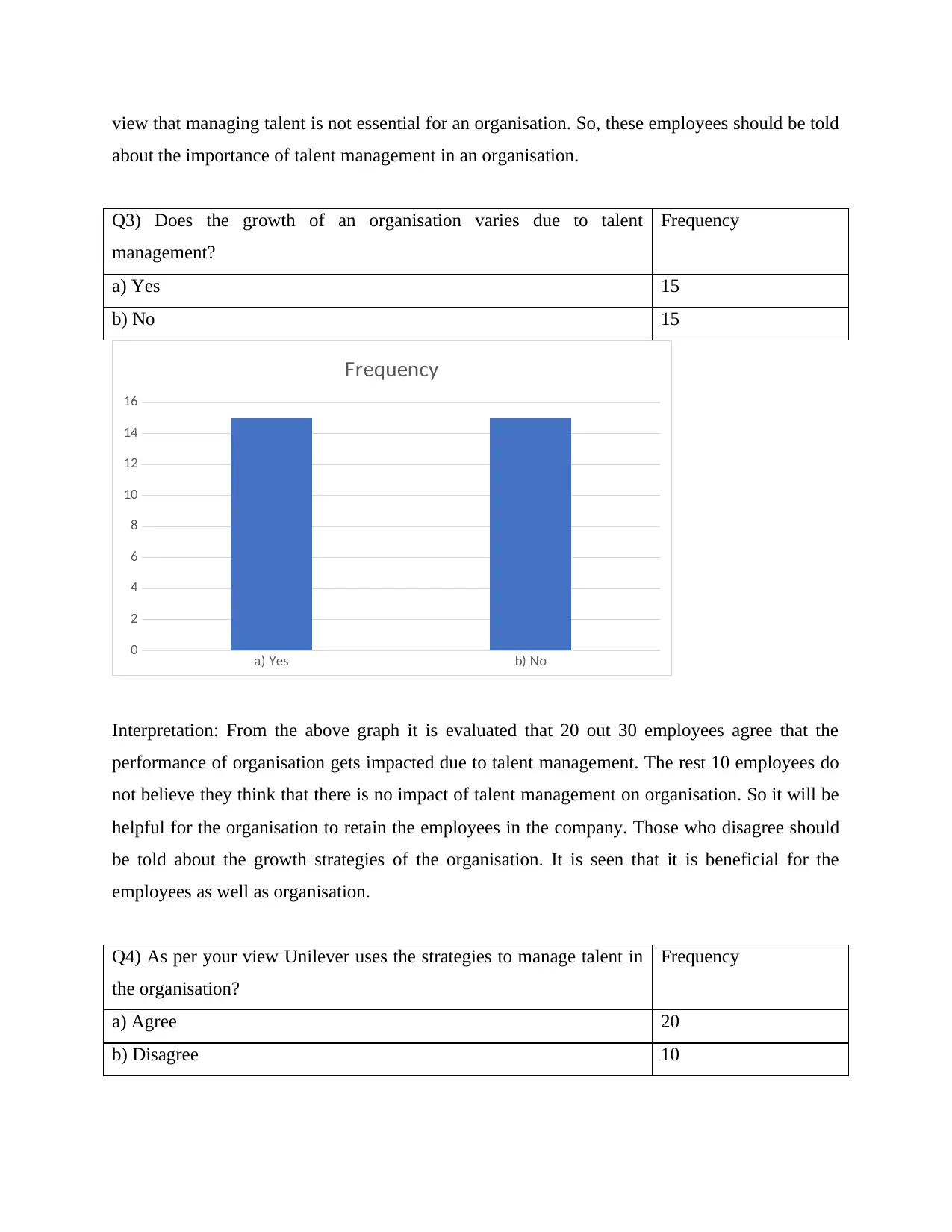
view that managing talent is not essential for an organisation. So, these employees should be told
about the importance of talent management in an organisation.
Q3) Does the growth of an organisation varies due to talent
management?
Frequency
a) Yes 15
b) No 15
a) Yes b) No
0
2
4
6
8
10
12
14
16
Frequency
Interpretation: From the above graph it is evaluated that 20 out 30 employees agree that the
performance of organisation gets impacted due to talent management. The rest 10 employees do
not believe they think that there is no impact of talent management on organisation. So it will be
helpful for the organisation to retain the employees in the company. Those who disagree should
be told about the growth strategies of the organisation. It is seen that it is beneficial for the
employees as well as organisation.
Q4) As per your view Unilever uses the strategies to manage talent in
the organisation?
Frequency
a) Agree 20
b) Disagree 10
about the importance of talent management in an organisation.
Q3) Does the growth of an organisation varies due to talent
management?
Frequency
a) Yes 15
b) No 15
a) Yes b) No
0
2
4
6
8
10
12
14
16
Frequency
Interpretation: From the above graph it is evaluated that 20 out 30 employees agree that the
performance of organisation gets impacted due to talent management. The rest 10 employees do
not believe they think that there is no impact of talent management on organisation. So it will be
helpful for the organisation to retain the employees in the company. Those who disagree should
be told about the growth strategies of the organisation. It is seen that it is beneficial for the
employees as well as organisation.
Q4) As per your view Unilever uses the strategies to manage talent in
the organisation?
Frequency
a) Agree 20
b) Disagree 10
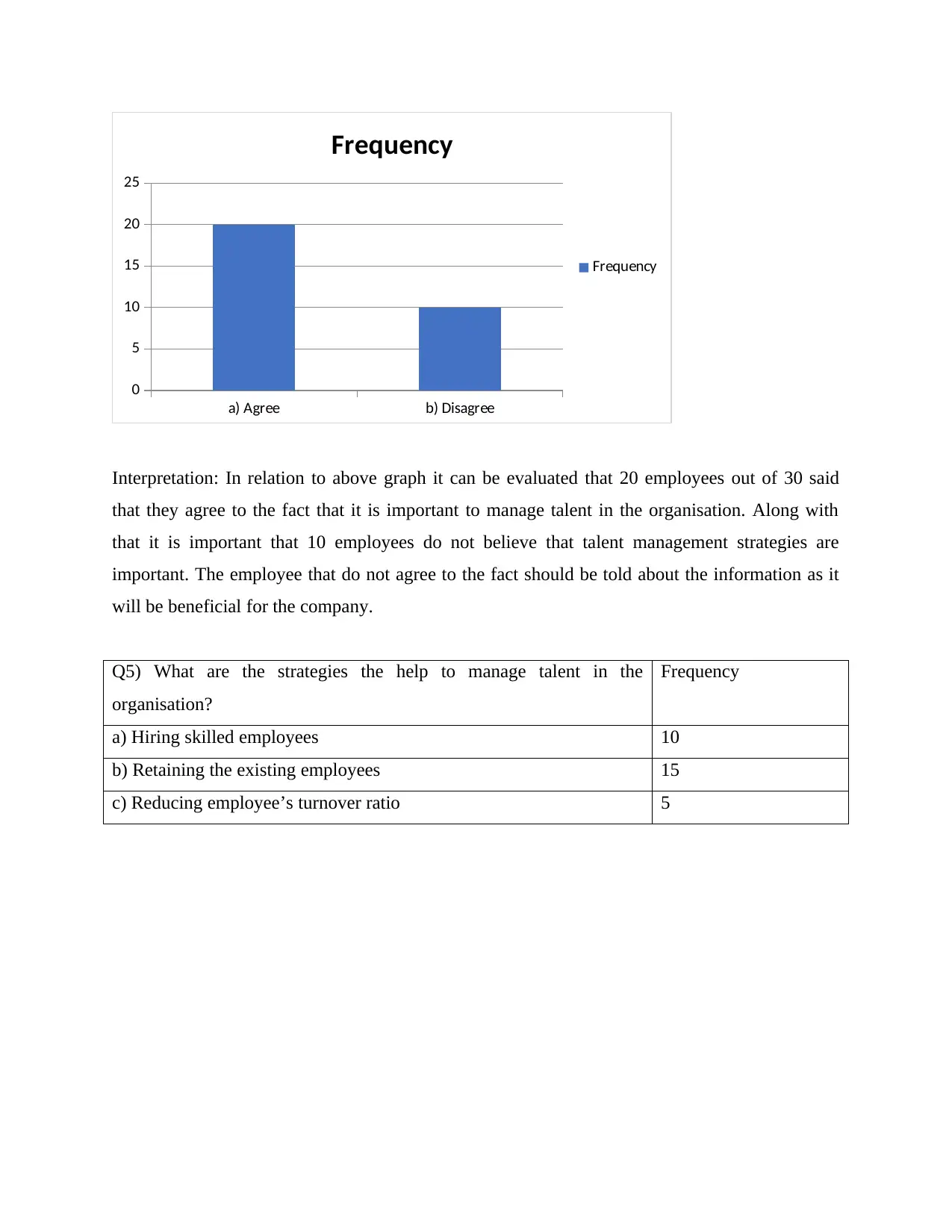
a) Agree b) Disagree
0
5
10
15
20
25
Frequency
Frequency
Interpretation: In relation to above graph it can be evaluated that 20 employees out of 30 said
that they agree to the fact that it is important to manage talent in the organisation. Along with
that it is important that 10 employees do not believe that talent management strategies are
important. The employee that do not agree to the fact should be told about the information as it
will be beneficial for the company.
Q5) What are the strategies the help to manage talent in the
organisation?
Frequency
a) Hiring skilled employees 10
b) Retaining the existing employees 15
c) Reducing employee’s turnover ratio 5
0
5
10
15
20
25
Frequency
Frequency
Interpretation: In relation to above graph it can be evaluated that 20 employees out of 30 said
that they agree to the fact that it is important to manage talent in the organisation. Along with
that it is important that 10 employees do not believe that talent management strategies are
important. The employee that do not agree to the fact should be told about the information as it
will be beneficial for the company.
Q5) What are the strategies the help to manage talent in the
organisation?
Frequency
a) Hiring skilled employees 10
b) Retaining the existing employees 15
c) Reducing employee’s turnover ratio 5
⊘ This is a preview!⊘
Do you want full access?
Subscribe today to unlock all pages.

Trusted by 1+ million students worldwide
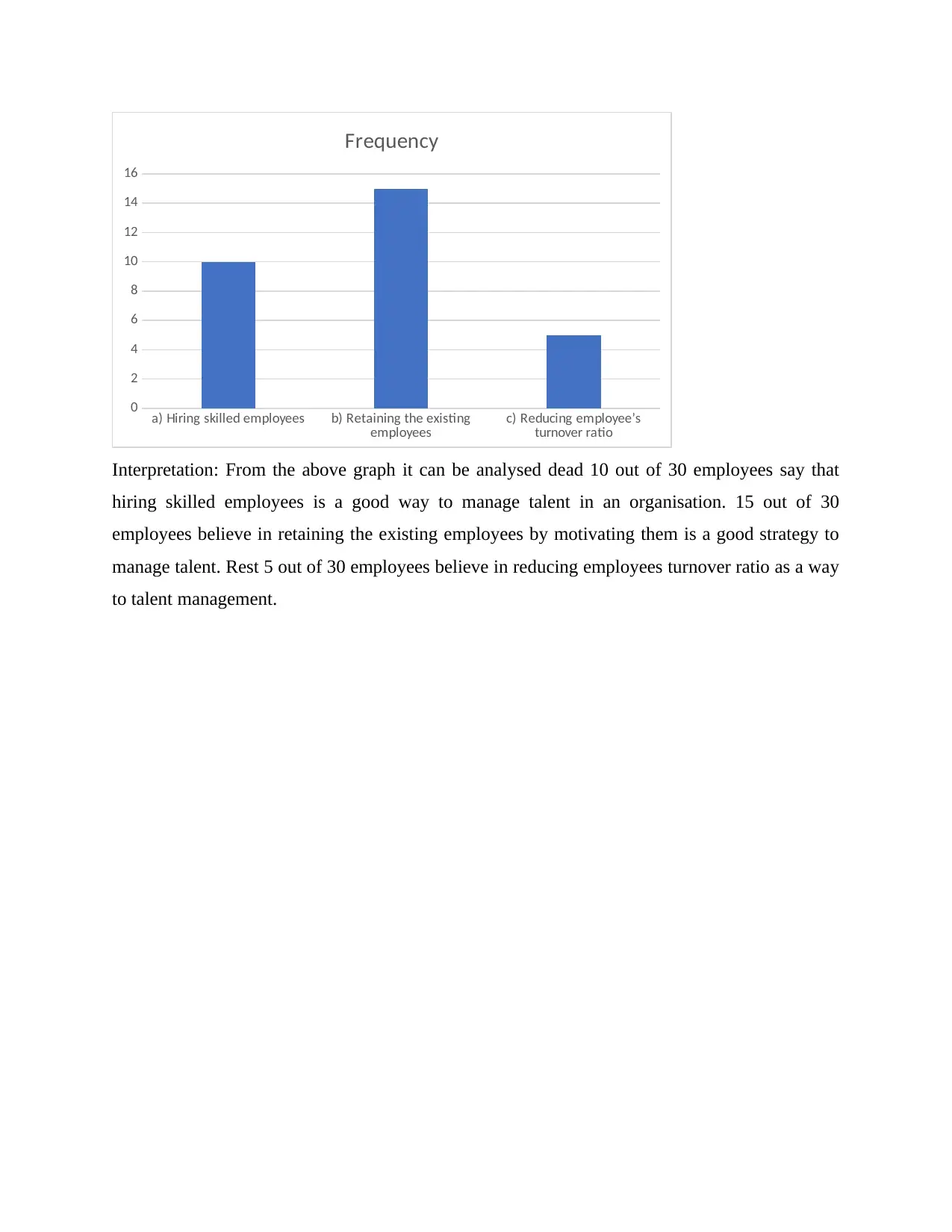
a) Hiring skilled employees b) Retaining the existing
employees c) Reducing employee’s
turnover ratio
0
2
4
6
8
10
12
14
16
Frequency
Interpretation: From the above graph it can be analysed dead 10 out of 30 employees say that
hiring skilled employees is a good way to manage talent in an organisation. 15 out of 30
employees believe in retaining the existing employees by motivating them is a good strategy to
manage talent. Rest 5 out of 30 employees believe in reducing employees turnover ratio as a way
to talent management.
employees c) Reducing employee’s
turnover ratio
0
2
4
6
8
10
12
14
16
Frequency
Interpretation: From the above graph it can be analysed dead 10 out of 30 employees say that
hiring skilled employees is a good way to manage talent in an organisation. 15 out of 30
employees believe in retaining the existing employees by motivating them is a good strategy to
manage talent. Rest 5 out of 30 employees believe in reducing employees turnover ratio as a way
to talent management.
Paraphrase This Document
Need a fresh take? Get an instant paraphrase of this document with our AI Paraphraser
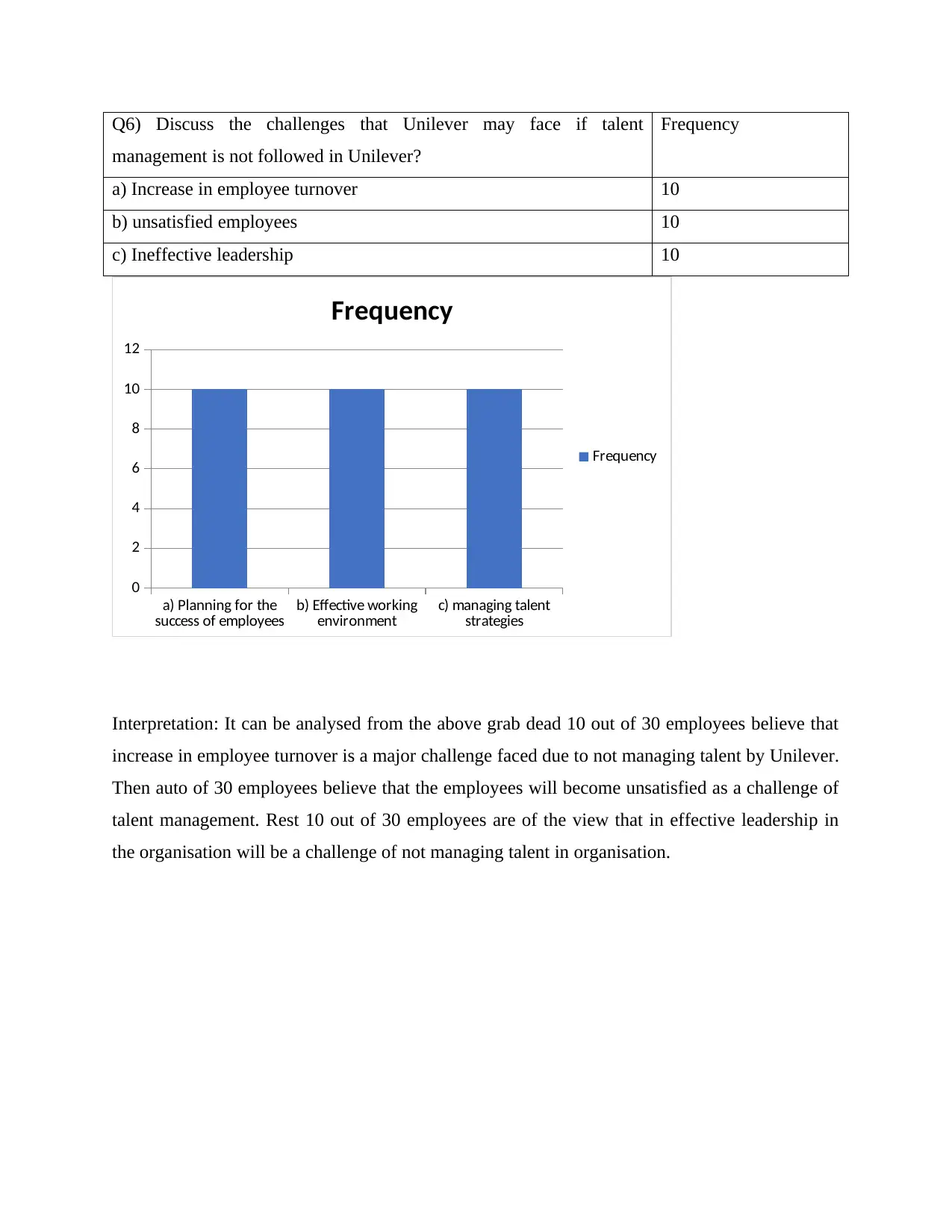
Q6) Discuss the challenges that Unilever may face if talent
management is not followed in Unilever?
Frequency
a) Increase in employee turnover 10
b) unsatisfied employees 10
c) Ineffective leadership 10
a) Planning for the
success of employees b) Effective working
environment c) managing talent
strategies
0
2
4
6
8
10
12
Frequency
Frequency
Interpretation: It can be analysed from the above grab dead 10 out of 30 employees believe that
increase in employee turnover is a major challenge faced due to not managing talent by Unilever.
Then auto of 30 employees believe that the employees will become unsatisfied as a challenge of
talent management. Rest 10 out of 30 employees are of the view that in effective leadership in
the organisation will be a challenge of not managing talent in organisation.
management is not followed in Unilever?
Frequency
a) Increase in employee turnover 10
b) unsatisfied employees 10
c) Ineffective leadership 10
a) Planning for the
success of employees b) Effective working
environment c) managing talent
strategies
0
2
4
6
8
10
12
Frequency
Frequency
Interpretation: It can be analysed from the above grab dead 10 out of 30 employees believe that
increase in employee turnover is a major challenge faced due to not managing talent by Unilever.
Then auto of 30 employees believe that the employees will become unsatisfied as a challenge of
talent management. Rest 10 out of 30 employees are of the view that in effective leadership in
the organisation will be a challenge of not managing talent in organisation.
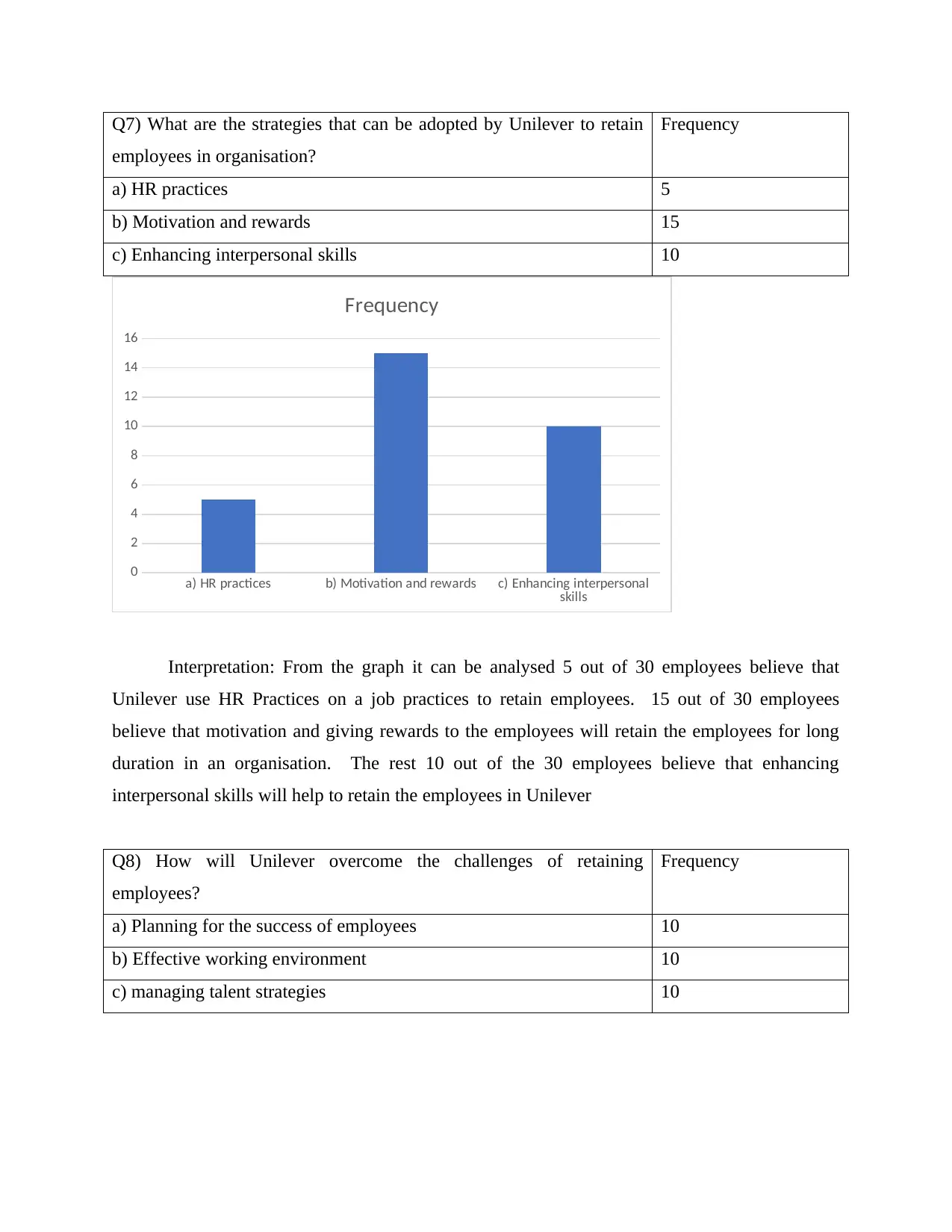
Q7) What are the strategies that can be adopted by Unilever to retain
employees in organisation?
Frequency
a) HR practices 5
b) Motivation and rewards 15
c) Enhancing interpersonal skills 10
a) HR practices b) Motivation and rewards c) Enhancing interpersonal
skills
0
2
4
6
8
10
12
14
16
Frequency
Interpretation: From the graph it can be analysed 5 out of 30 employees believe that
Unilever use HR Practices on a job practices to retain employees. 15 out of 30 employees
believe that motivation and giving rewards to the employees will retain the employees for long
duration in an organisation. The rest 10 out of the 30 employees believe that enhancing
interpersonal skills will help to retain the employees in Unilever
Q8) How will Unilever overcome the challenges of retaining
employees?
Frequency
a) Planning for the success of employees 10
b) Effective working environment 10
c) managing talent strategies 10
employees in organisation?
Frequency
a) HR practices 5
b) Motivation and rewards 15
c) Enhancing interpersonal skills 10
a) HR practices b) Motivation and rewards c) Enhancing interpersonal
skills
0
2
4
6
8
10
12
14
16
Frequency
Interpretation: From the graph it can be analysed 5 out of 30 employees believe that
Unilever use HR Practices on a job practices to retain employees. 15 out of 30 employees
believe that motivation and giving rewards to the employees will retain the employees for long
duration in an organisation. The rest 10 out of the 30 employees believe that enhancing
interpersonal skills will help to retain the employees in Unilever
Q8) How will Unilever overcome the challenges of retaining
employees?
Frequency
a) Planning for the success of employees 10
b) Effective working environment 10
c) managing talent strategies 10
⊘ This is a preview!⊘
Do you want full access?
Subscribe today to unlock all pages.

Trusted by 1+ million students worldwide
1 out of 16
Related Documents
Your All-in-One AI-Powered Toolkit for Academic Success.
+13062052269
info@desklib.com
Available 24*7 on WhatsApp / Email
![[object Object]](/_next/static/media/star-bottom.7253800d.svg)
Unlock your academic potential
Copyright © 2020–2026 A2Z Services. All Rights Reserved. Developed and managed by ZUCOL.





